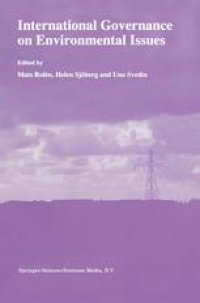
Ebook: International Governance on Environmental Issues
- Tags: Environmental Management, Political Science general, Social Sciences general
- Series: Environment & Policy 9
- Year: 1997
- Publisher: Springer Netherlands
- Edition: 1
- Language: English
- pdf
During the last years international cooperation on environmental issues has increased, especially after UNCED in Rio de Janeiro in 1992. The efforts made by the United Nations or groups of states to solve more or less global problems through negotiation has brought up a number of questions of interest for the research community. How are inter national agreements achieved? Which roles do governments, ministries, diplomats, researchers, experts and NGO's play? Is the negotiation process of today effective or would we get better results through regional, national or local actions? How should we understand the interplay between the different societal levels where environmental 'governance' is created? And what constitutes a successful implementation of a conven tion or bilateral agreement in practical policy? The Swedish Council for Planning and Coordination of Research (FRN) has since the early 1980's initiatated and funded environmental research, and in particular for research problems with a focus on the interplay between humans~society-natural resources. In order to get a picture of on-going research with relevance to an understanding of inter national environmental governance, and to stimulate the research com munity towards addressing new issues, the FRN arranged an inter national workshop for August 17-19, 1994 at Krusenberg Manor, near Uppsala. The workshop could also be seen in the context of FRN's long term interest in the issues of 'the Human Dimensions of Global Environ mental Change', including the activities of the Human Dimensions Programme (now IHDP) at the international level.
The internationalization of the world has put issues of governance at the heart of our future. This is obvious for most people when it comes to the environment. During the 1990's international cooperation on environmental issues has increased, especially after UNCED in Rio de Janeiro 1992.
In this book, a number of distinguished people with experience of environmental affairs contribute their views on the lessons learned from environmental governance so far, the current situation, and the prospects for the future of this mode of solving common international issues. Their professional backgrounds range from academia and diplomacy to activism. Among the contributors to the book, experts on governance, international negotiations and local experiences can be found; this collected volume therefore offers perspectives from science, business, and non-governmental organizations.